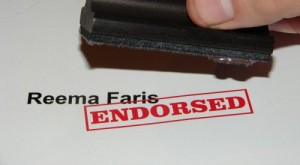Posts Tagged ‘endorsement’
All Candidates Meeting – October 27th
 As mentioned earlier, I’m very pleased that my candidacy has been endorsed by the West Vancouver Citizens for Good Government. The speech I gave the night of the endorsement meeting, and which is reprinted below, focused on my experience as a parent-volunteer within the public education system. These remarks are also featured in the television spot filmed by Shaw Cable Television, a service offered to all Lower Mainland candidates, and which will air on November 6 at 7:15 p.m. and November 13 at 11:15 p.m.
As mentioned earlier, I’m very pleased that my candidacy has been endorsed by the West Vancouver Citizens for Good Government. The speech I gave the night of the endorsement meeting, and which is reprinted below, focused on my experience as a parent-volunteer within the public education system. These remarks are also featured in the television spot filmed by Shaw Cable Television, a service offered to all Lower Mainland candidates, and which will air on November 6 at 7:15 p.m. and November 13 at 11:15 p.m.
I would love to hear from you, so please don’t hesitate to forward your thoughts, comments, questions and suggestions to me.
Remarks presented at the West Vancouver Citizens for Good Government Endorsement Meeting – October 27, 2011
Good evening. I’m Luc’s Mom, Reema Faris, and I’m running as a candidate for the position of Trustee with the West Vancouver Board of Education.
Why?
I see it as the next leg of a journey that began when Luc started Kindergarten in 2006.
I walked into the Parents Advisory Council meeting as a new parent and walked out as the school’s representative to West Van DPAC. That transition, in the space of an hour — maybe an hour and a half — reflects my belief in working for my community.
Since then, I’ve served continuously as a member of the PAC executive including two years as Chair and one year as Co-Chair.
One of my favourite projects has been the noon-hour Creative Writing Club which I started last year.
I’ve worked with the community of educators at the school and within the district as well as district staff and parents to expand the playground at Ecole Cedardale, purchase laptop computers, enhance the library’s collection, and much more.
I believe now’s the time to translate my experience from that of a parent-volunteer to making new contributions as a member of the Board of Education.
In that capacity, I’d like to make sure the programs we offer equip students with the critical thinking skills they need to cope with our ever-changing world.
I want to make sure students develop a strong sense of ownership for their own learning. Let’s make sure students learn to ask questions because they recognize the intrinsic value of learning for the pure pleasure of learning.
What about technology? How do we integrate technology use sensibly and equitably in our classrooms while taking into account parental concerns?
I’d like to talk about the arts in education and revitalizing board meetings, but two minutes pass by quickly, almost as quickly as my five years as an active parent-volunteer.
I’m ready to take the next step. Because I believe the foundation of our society depends on the education we provide our children. We need a universally accessible public education system if what we want to build is a socially just society.
My name is Reema Faris and I hope I can count on your support at the ballot box on November 19th.
Thank you.
Questioning Questions
I’m a big fan of questions. I’m sure that I could find a question to pose about almost any topic or situation, often to the annoyance of family members.
This ability to ask questions is what underpins our ability to be critical thinkers and critical thinking is being pinpointed, more and more, as an essential skill for students.
In political campaigns, questions are fundamental in the research we do to get to know our candidates in order to formulate our voting decision. Asking questions is key, I think, to a healthy democratic process. That’s why there’s such an outcry when we sense our ability to ask questions is being curtailed or when answers seem to be so scripted that they don’t sound sincere.
In my community, the West Vancouver Citizens for Good Government (WVCGG) is a group of citizen-voters which makes recommendations to the public on which candidates they feel would best-serve and represent the community in the role of municipal councillor or school trustee.
Their process is extensive: those candidates who opt to seek endorsement are interviewed by WVCGG executive members and the group also hosts a public All Candidates Meeting (ACM). A general meeting is held a week after the ACM where, after speeches from candidates, the WVCGG executive presents their endorsement recommendations. The members then cast their votes on which candidates they feel the organization should endorse.
At the October 27 endorsement meeting, I was very gratified when the WVCGG’s members voted to endorse my candidacy.

In my interview with the WVCGG executive, there were 12 questioners representing a broad cross-section of West Vancouver residents. Each question was posed by a different panelist, and the questions were spot on — they addressed some of the general issues in education as well as those which pertained only to West Vancouver.
It was a job interview with appropriately targeted questions. In contrast to the WVCGG’s job interview, The Vancouver Sun (the Sun), as part of their municipal candidates’ survey, asked a number of questions which I found disconcerting.
The Sun’s online survey featured a series of drop-down menus. While this may be the most efficient way of collecting data, I found the questions posed regarding ethnic background, religion, and birth country unacceptable.
Candidates should be judged on the basis of the stance they take on issues — not on whether or not they were born in Canada, for example. I feel that if the Sun wanted to identify areas where the political representatives do not reflect in one way or another the residents of their communities (as an editor at the paper indicated to me), then they should assign their reporters to investigate the matter and to file their stories accordingly.
The other rebuttal I received when I raised my concerns was that the questions asked were similar to those asked on the census. To me, that’s entirely different: census information is private, presented in the aggregate, and collecting the information is an officially sanctioned government initiative.
The Sun, by profiling candidates in their database based on elements such as ethnicity, religion, and place of birth, creates the impression in voters’ minds that these are factors upon which candidates should be judged. I don’t believe that’s true. If a voter, for example, were concerned about the religious bias of a candidate and how that might influence their action on an issue, the best way to ascertain that is by asking the candidate a question. We cannot assume that having candidates merely identify themselves as a member of a particular religion will tell us what their position or view is on a topic.
A candidate’s merit rests on their opinions, their experience, and their vision, not on the designation with which they may be labelled.
I urge all voters to take advantage of opportunities to meet their local candidates and to use the electronic tools at our disposal to make contact with them. Ask questions, but make sure they are the type of questions which will be of the most value to you in making your decision on election day.